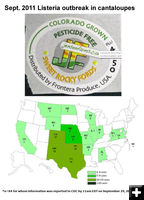Update on multistate outbreak of Listeriosis linked to cantaloupes
84 people affected; 2 cases in Wyoming
by Pinedale Online!
October 2, 2011
As of Thursday, September 29, 2011, a total of 84 persons infected with any of the four outbreak-associated strains of Listeria monocytogenes associated with eating infected cantaloupes have been reported to Centers for Disease Control (CDC) from 19 states. All illnesses started on or after July 31, 2011. The number of infected persons identified in each state is as follows: Alabama (1), Arkansas (1) California (1), Colorado (17), Illinois (1), Indiana (2), Kansas (5), Maryland (1), Missouri (3), Montana (1), Nebraska (6), New Mexico (13), North Dakota (1), Oklahoma (11), Texas (14), Virginia (1), West Virginia (1), Wisconsin (2), and Wyoming (2).
Fifteen deaths have been reported: 3 in Colorado, 1 in Kansas, 1 in Maryland, 1 in Missouri, 1 in Nebraska, 5 in New Mexico, 1 in Oklahoma, and 2 in Texas.
The outbreak has been connected with Jensen Farmsí Rocky Ford-brand cantaloupes from Colorado.
On September 14, 2011, the U.S. Food and Drug Administration (FDA) issued a press release to announce that Jensen Farms issued a voluntary recall of its Rocky Ford-brand cantaloupes after being linked to the multistate outbreak of listeriosis.
Although Jensen Farms issued a voluntary recall and the recalled cantaloupe should be off store shelves, more ill persons may be reported because of the time lag between diagnosis and laboratory confirmation and also because up to 2 months can elapse between eating contaminated food and developing listeriosis.
CDC recommends that consumers not eat Rocky Ford-brand cantaloupe from Jensen farms. This is especially important for older adults, persons with weakened immune systems, and pregnant women.
Even if some of the cantaloupe has been eaten without becoming ill, dispose of the rest of the cantaloupe immediately. Listeria bacteria can grow in the cantaloupe at room and refrigerator temperatures.
Cantaloupes that are known to NOT have come from Jensen Farms are safe to eat. If consumers are uncertain about the source of a cantaloupe for purchase, they should ask the grocery store. A cantaloupe purchased from an unknown source should be discarded: "when in doubt, throw it out."
Listeriosis can be fatal, especially in certain high-risk groups. These groups include older adults, people with compromised immune systems and certain chronic medical conditions (such as cancer), and unborn babies and newborns. In pregnant women, listeriosis can cause miscarriage, stillbirth, and serious illness or death in newborn babies, though the mother herself rarely becomes seriously ill.
A person with listeriosis usually has fever and muscle aches, often preceded by diarrhea or other gastrointestinal symptoms. Almost everyone who is diagnosed with listeriosis has invasive infection (meaning that the bacteria spread from their intestines to the bloodstream or other body sites). The disease primarily affects older adults, persons with weakened immune systems, pregnant women, and newborns.
Listeriosis is treated with antibiotics. Persons in the high-risk category, including older adults, persons with weakened immune systems, and pregnant women, who experience flu-like symptoms within 2 months after eating contaminated food should seek medical care and tell the physician or health care provider about eating the contaminated food.
If a person has eaten food contaminated with Listeria and does not have any symptoms, most experts believe that no tests or treatment are needed, even for persons at higher risk for listeriosis.
Click on this link for more information from the Centers for Disease Control:
http://www.cdc.gov/listeria/outbreaks/cantaloupes-jensen-farms/093011/index.html
|
